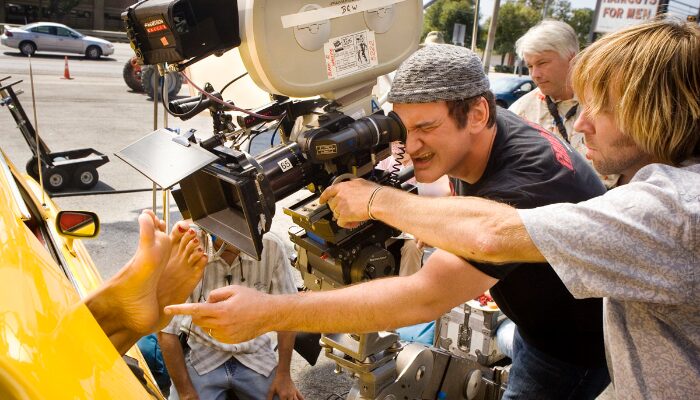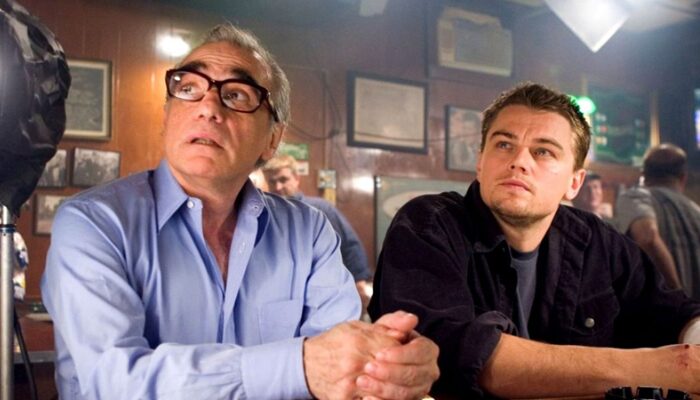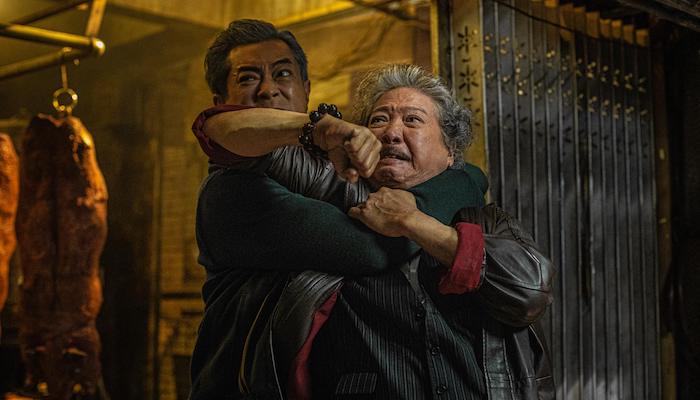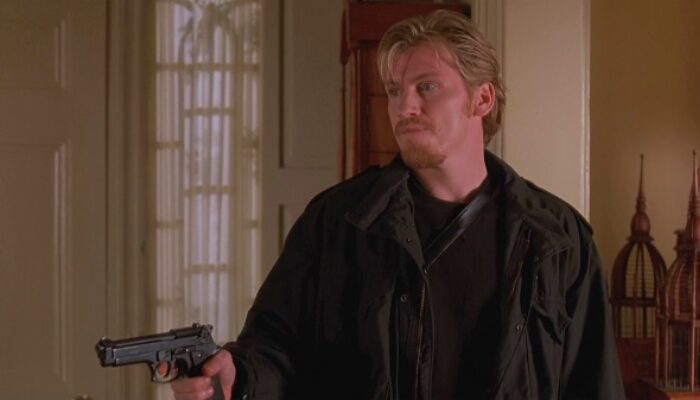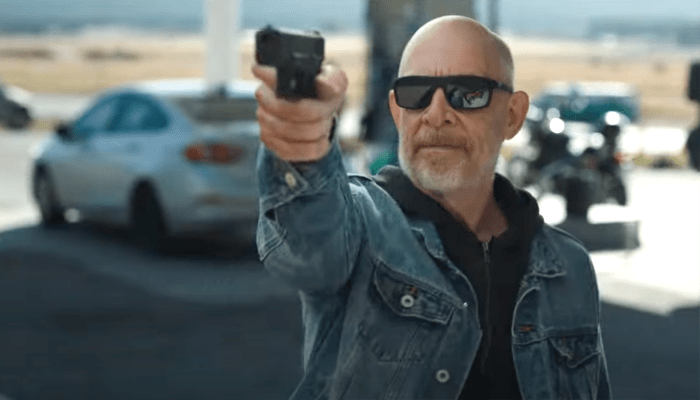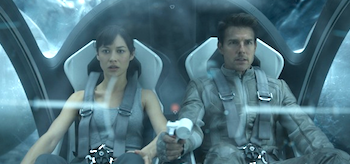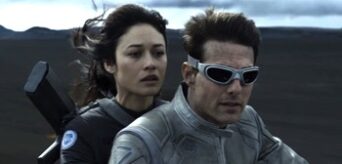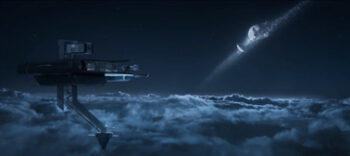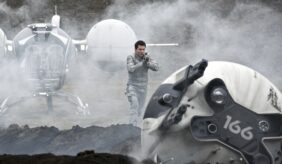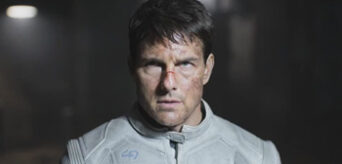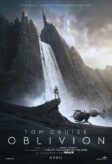Film Review: OBLIVION (2013): Tom Cruise, Olga Kurylenko, Melissa Leo
Oblivion (2013) Film Review, a movie directed by Joseph Kosinski and starring Tom Cruise, Andrea Riseborough, Olga Kurylenko, Morgan Freeman, Melissa Leo, Zoe Bell, Nikolaj Coster-Waldau, James Rawlings, Catherine Kim Poon, Jaylen Moore, Lindsay Clift, John L. Armijo, Jordan Sudduth, Andrew Breland, and Jeremy Sande.
*This movie review contain numerous spoilers so please be warned before you start reading it. *
Oblivion had the plotting of a novel and its birth place is not far off. Oblivion had more “obvious” depth and a more resounding third act than Joseph Kosinski’ TRON: Legacy. TRON: Legacy‘s substrata regions were implied by the elements present in the film but never explored. Where TRON: Legacy was almost devoid of its characters having an emotional resonance with its audience, Oblivion managed to strike a sad, bitter-sweet cord. The past in the film was as black and as sinister as the one in James Cameron‘s Terminator 2: Judgement Day. The main character, Commander Jack Harper (Tom Cruise), never showed the past’s weight on his conscience but then he was never given a chance to.
This was a missed opportunity that Roland Emmerich took full advantage of in Anonymous‘ third act reveal and one that David Fincher professionally exploited through Rooney Mara and her scream of frustration as the elevator doors closed in The Girl with the Dragon Tattoo.
One of the best performances in Oblivion came from the most unlikely character, Julia (Olga Kurylenko). Seeing her character smile when two other characters touched each other in a fond, loving way showed the toolbox Kurylenko had developed as a thespian.
After the film ends, the viewer will wonder why Julia did not speak up in that moment. She just sat there, looked, smiled but said nothing (Earth, its crisis, the situation, and her profession probably had much to do with her terseness). I have to admit though, it was intriguing. “Why is she smiling like that?” is what went through the viewer’s mind when they saw this scene.
Other scenes in the film were also entertaining in their brevity. Destroying The Moon to cripple Earth’s ability to defend itself was brilliant and indefensible (making it that much more of a shrewd first strike), maybe even more so than the Psychlos’ gas drone plane in Battlefield Earth: A Saga of the Year 3000.
The memory wipe as security measure was another brilliant plot point but one would think tests would have been done to make sure the erasure was complete and irreversible. Jack’s memory fragments were like those of Rheya in Steven Soderbergh‘s Solaris but they only possessed a percentage of the former’s power. This was not poor writing but a plot device, a narrative tool through which more and more was eventually revealed for maximum impact.
The second act of Oblivion had the standard movie reveals and introductions but it was the way in which they were handled that made them above ordinary.
One moment that went no where was when Sykes (Nikolaj Coster-Waldau) shot Commander Harper in the chest and then Harper got right back up. What was the purpose of that? To show that Harper was wearing body armor of some kind or that Sykes was firing blanks?
The second act question marks did not end with this dubious moment.
How did the resistance know or find out the NASA frequency and the codes to bring down that NASA shuttle? How did they know that the shuttle was in Earth orbit to begin with? Screenwriters Joseph Kosinski, William Monahan, Karl Gajdusek, and Michael Arndt may have thought of these questions but like Eric Red‘s script for The Hitcher, left them out. In lieu of these answers, audience intuitiveness took their place (perhaps the screenwriters’ plan all along).
This modus operandi accounts for some of the question marks in the film but not all of them.
If the resistance knew the exact coordinates of where the NASA shuttle was going to crash land, why didn’t they have people on the ground to recover its occupants immediately before the drones zeroed in and destroyed what was left? Malcolm Beech (Morgan Freeman) said he saw Jack at the crash site taking preventive action yet where was his resistance personnel? Beech and the resistance could not have known that Commander Harper would get there before the drones did unless they assumed: a.) his curious nature would somehow make that happen against all odds and b.) his location relative to the crash site would make it inevitable. Those are big ifs, too big for a smart leader to count on but perhaps not for one facing the extinction of his species.
The third act of Oblivion had more than a few surprises, the last two being the most rewarding.
Andrea Riseborough, who had mostly been responding to presented stimuli up to this point in the film, goes through a range of emotions, unlike her co-star Tom Cruise (he is the main protagonist but his emotional output is the same throughout the film). She is the character that the viewer has an emotional reaction towards even-though it was Cruise whom the audience’s attention was firmly levied on.
Countering Riseborough’s third act strength and Cruise’s adequate yet uneventful performance was Earth’s resistance fighters. They were the weak link in the film, the viewer never being for or against them. Ambivalence plagued the entirety of their storyline except for Malcolm Beech and the sentiments his shared with other characters.
The idea of soulless Jack Harpers pouring out of ships killing anything human was a great idea and I was pleased that Joseph Kosinski didn’t film it and let the viewer’s imagination do the work.
The true enemy in Oblivion was ingenious, using the past as ingredients to create a specific and familiar present, manipulating its chess pieces’ hopes and dreams. By giving its retainers an attainable goal, a finish line to aspire to, it showed how well it knew the field of psychology and the art of manipulation.
Oblivion‘s screenwriters were crafty at this point in the film but aggravating as well: if Julia had the NASA shuttle black box, why didn’t she immediately play it to find out what happened 70 years ago? Why didn’t she play it for Jack? She couldn’t have known she was in a movie, could she? She couldn’t have been saving it for a dramatic reveal in the third act? That sounds like something a skilled though hackneyed screenwriter might due.
Speaking of being overused, why did the drones deactivate when the space station (The Tet) was destroyed? They were powered separately from it (shown in act one of the film) and operated independently (they judged situations for themselves e.g. not killing Jack multiple times). Each drone would still have its last received order from Tet on their CPU, even if Tet were destroyed, so why did they just fall from the sky? So the resistance would not be obliterated by them? So the good guys could prevail?
George Lucas wrote the exact same plot points in the third act of Star Wars: Episode 1: The Phantom Menace. It made no-sense in that film and it made even less sense in this film since Oblivion‘s screenwriters should have learned from that egregious Computer Science mistake.
When originality did kickback into Oblivion, it was exciting. The NASA space shuttle flight flashbacks were riveting, one of the best story arc sequences in the film. This could have easily been poorly handled but it was not. The black box’s recovery and the other elements from the first and second act of the film all led to it and was one of the film’s high points. When one character turned and said: “Jack”, the viewer felt that character’s fear and dread.
I would love to know what happened to the astronauts inside The Tet space station. Once again though, Joseph Kosinski let the audience’s imagination have at that quandary.
Rating: 8.5/10
Related Articles
FilmBook's Newsletter
Subscribe to FilmBook’s Daily Newsletter for the latest news!

